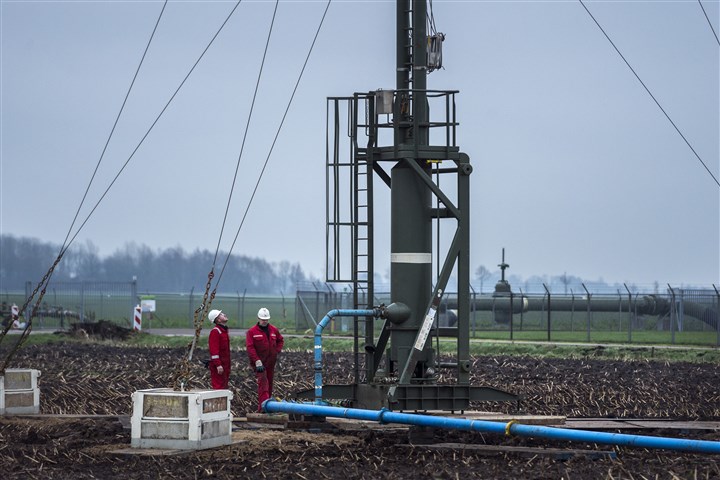Energy reserves

The remaining natural gas reserves in the Netherlands have decreased by almost 54 percent since 2000. In recent years only small new natural gas reserves have been discovered, adding less than 1 percent to the remaining 846 billion Sm3 in 2016. The on-going depletion of existing natural gas reserves was even more severe because - in addition to the annual extractions - the existing reserves underwent a downward revaluation of over 60 billion Sm3 in the last five years. Besides natural gas, the Netherlands has some small oil deposits, currently 4 percent of total fossil energy reserves. An upward revaluation of existing oil deposits has meant that oil reserves have remained at the same level since 2000, despite annual extractions. Revaluations result from decisions to apply new extraction technology to particular oil fields; in this case extraction restarted in fields that had been closed for more than a decade.
| Energy reserves (mld Sm3) | |
|---|---|
| 2000 | 1777 |
| 2001 | 1738 |
| 2002 | 1689 |
| 2003 | 1615 |
| 2004 | 1572 |
| 2005 | 1510 |
| 2006 | 1439 |
| 2007 | 1390 |
| 2008 | 1364 |
| 2009 | 1390 |
| 2010 | 1304 |
| 2011 | 1230 |
| 2012 | 1130 |
| 2013 | 1044 |
| 2014 | 932 |
| 2015 | 940 |
| 2016 | 846 |
The issue
The Netherlands still has significant quantities of natural gas, although these amount to less than 20 percent of the original reserve. In addition, there are also some smaller remaining oil deposits.. Green growth aims to avoid unsustainable pressure on natural assets. However, definitions of sustainability vary. According to the ‘weak’ interpretation of sustainability, policy that increases stock value, even if physical reserves decrease, is deemed sustainable, as it provides possibilities for substitution. Green growth, on the other hand, has more in common with the so-called ‘strong’ interpretation of sustainability, which emphasises the use of physical indicators to monitor whether certain exhaustible resources could reach critical levels or even fall below certain thresholds. Again substitutes for these fossil energy resources, like renewable energy options, can prevent these resources reaching critical levels in the short term.
Analysis
Ever since the discovery of the natural gas and oil reserves in the 1950s and 1960s they have been exploited. Indeed, the extraction of natural gas still makes a significant contribution to the Dutch treasury and economic growth. But these resources are not inexhaustible and new discoveries have become fewer and smaller.. Current assessments suggest that over 80 percent of the initial gas reserves have been extracted. At the end of 2016, known natural gas reserves were expected to be enough to meet Dutch domestic requirements for another 16 years. This is based on net production in 2016, which was substantially lower than the 25-year average. The decreasing total stock is can be seen as an indication of unsustainable behaviour, as non-renewable fossil energy deposits (expected reserves) are likely to run out within a few decades. The combination of extraction, downward revaluation - as increasingly observed in recent years - and the absence of substantial new discoveries has resulted in a relatively fast decrease in reserves in recent years.
After a series of minor earthquakes in the north of the country, widely seen as being linked to the on-going extractions from the Groningen reserve, the government restricted extraction from that particular reserve.
International comparison
In an international perspective, the Netherlands still has significant energy reserves. For the purposes of international comparison, the energy reserves of the European Union member states were converted to per capita terms. Just 13 of the 27 EU member states in the comparison have significant oil, natural gas or coal reserves, six of which have larger per capita reserves than the Netherlands. Poland has the largest energy reserves per capita - mainly anthracite and bituminous coal - followed by the Czech Republic and Germany Bulgaria, Hungary and Greece (largely lignite). On average energy reserves in these EU states have decreased by about 15 percent since 2000. In the Netherlands the reserves more than halved. So, although the Netherlands still has significant energy reserves, its above average per capita depletion rate over the last 16 years compared to other European OECD countries has resulted in a relatively fast declining remaining reserve.
| Energy reserves (terajoules per inwoner) | |
|---|---|
| Poland | 15.76 |
| Czech Republic | 6.28 |
| Germany | 6.1 |
| Hungary | 4.51 |
| Greece | 3.72 |
| Netherlands | 1.29 |
| Spain | 0.61 |
| Denmark | 0.5 |
| United Kingdom | 0.34 |
| Italy | 0.07 |
| France | 0 |
| Source: BP, Eurostat | |